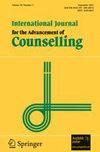Broaching Client Identities: Integrating a Critical Consciousness Lens in Counselling Practice
IF 1
Q4 PSYCHOLOGY, APPLIED
INTERNATIONAL JOURNAL FOR THE ADVANCEMENT OF COUNSELLING
Pub Date : 2023-11-11
DOI:10.1007/s10447-023-09535-y
引用次数: 0
Abstract
Abstract Cultural competence and, to a lesser extent, cultural safety for developing culturally responsive practice have been the dominant paradigms in the helping professions in Aotearoa New Zealand. This article focuses on a paradigm shift toward critical and structural consciousness in a masters-level counselling curriculum. Authors in this study undertook a qualitative inquiry in exploring counselling students’ experiences of a critically conscious curriculum, culminating in their application of the skill of broaching as a strategy for discussing client intersectional identities and structural and systemic issues. The students described experiences of discomfort, challenge, and transformative learning. Unique and nuanced challenges of learning broaching are delineated by the students. Findings suggest that learners must have complex understandings of critically conscious concepts and local dominant norms to effectively explore intersectional and marginalised identities with clients. Direction for educators and supervisors in ways to anticipate common challenges and to better train and supervise beginning counsellors in broaching are included.探讨来访者身份:在咨询实践中整合批判性意识镜头
文化能力和文化安全在较小程度上是发展文化响应实践的主要范式,在新西兰奥特罗阿的帮助行业。这篇文章的重点是范式转移到关键和结构意识在硕士水平的辅导课程。本研究的作者进行了一项定性调查,探讨了咨询学生在批判性意识课程中的经验,最终在他们应用拉拉技巧作为讨论客户交叉身份和结构和系统问题的策略时达到了高潮。学生们描述了不适、挑战和变革性学习的经历。学习拉削的独特和微妙的挑战是由学生描述的。研究结果表明,学习者必须对批判性意识概念和当地主导规范有复杂的理解,才能有效地探索与客户的交叉和边缘化身份。指导教育工作者和主管如何预测共同的挑战,并更好地培训和监督初入职场的咨询师。
本文章由计算机程序翻译,如有差异,请以英文原文为准。
求助全文
约1分钟内获得全文
求助全文
来源期刊

INTERNATIONAL JOURNAL FOR THE ADVANCEMENT OF COUNSELLING
PSYCHOLOGY, APPLIED-
CiteScore
2.70
自引率
6.70%
发文量
38
期刊介绍:
The International Journal for the Advancement of Counselling is published under the auspices of the International Association for Counselling. It promotes the exchange of information about counselling activities throughout the world. The Editorial Board is committed to working with diverse authors from varied backgrounds to meet the publication standards for the International Journal for the Advancement of Counselling, including assistance with organization, structure, and style for publication. The journal publishes conceptual, practical, and research contributions that provide an international perspective on the following areas:
Theories and models of guidance and counselling;
Counsellor education and supervision;
State of the art reports on guidance and counselling in specific settings;
Social justice and equity (e.g., issues of diversity, advocacy, racial or ethnic identity, religion and culture, gender issues);
Special applications;
Counselling services in countries with social and economic challenges.
 求助内容:
求助内容: 应助结果提醒方式:
应助结果提醒方式:


